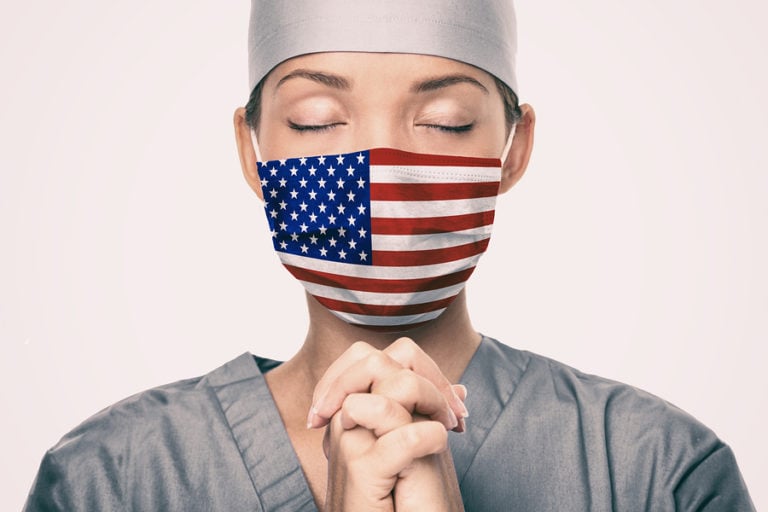They Said There Would be Masks

"Make sure you have your own mask on before helping others." – Daniel Handler
Pandemics require healers to take care of the sick. If healers fail, we are left defenseless. With the shortage of basic masks and gloves, many nurses are now at personal risk. Some are left questioning, "Is this what I signed up for?"
How Can We Be Short?
Somewhere between linen changes and sterile field setups, every nursing student learns the basics of donning and doffing personal protective equipment (PPE) in a nursing skills class. At the time, it was unfathomable that these supplies might not be available. Unfortunately, it's our current reality. Nurses are finding themselves in the middle of a pandemic without adequate PPE. How could this possibly happen in America?
The primary cause is an interruption in the global supply chain. Before COVID-19, the majority of mask makers lived overseas in countries like China and Taiwan. China was hit with the virus first, and could not keep up with the production needed within its borders – let alone think about sharing with other countries. The only two American companies, 3M and Prestige Ameritech, have also been unable to keep up with demands concerned about potential risks for frontline healthcare workers, The World Health Organization (WHO) is now working with governments and healthcare industries to increase the production of PPE by 40%.
Send in the Cavalry!
Although the WHO is working to increase PPE distribution and companies from the private sector have started producing more facemasks, the shortage continues. So why are we still not seeing these extra masks?
The WHO has warned that in addition to the rising demand, shortages are further complicated by hoarding, panic buying, and misuse. Panicked people buy and stockpile large quantities. Masks are sitting in warehouses while nurses remain at risk. Some entrepreneurs even engage in unethical behavior by purchasing masks in bulk and re-selling them at inflated prices.
Sometimes, hospital administrators take extreme measures to come through for their staff. Here is an amusing anecdote published in the New England Journal of Medicine about a well-intentioned man, who was nearly foiled by some shady characters and even the Federal Bureau of Investigation (FBI).
So, What's the Deal With Cloth Masks?
Nurses live the dual lives of work and home and have different rules for each setting. While caring for coughing and sneezing COVID patients, high filtration masks are advised. The N95 respirator mask is universally recognized as the preferred mask to prevent the transmission of aerosolized virus particles. When properly fitted, N95 masks are designed to block 95% of very small particles. Surgical masks are loose-fitting and do not adequately filter viruses. That's why it's especially important for healthcare workers to wear N95 masks!
If surgical masks do not provide complete protection, how can we trust cloth masks to do so? The fabric has large holes, which can allow the passage of virus particles. Even so, the Center for Disease Control (CDC) recommends the use of cloth masks as an alternative when America re-opens.
So if it doesn't prevent the transmission of COVID-19, why are we wearing cloth masks? It's important to keep in mind that people can test positive 1 to 3 days before developing symptoms. Additionally, some infected people never develop symptoms. This means that people are spreading germs without knowing they are contagious. Cloth masks prevent aerosolization of germs when people cough, sneeze or breathe. Combined with other preventive measures such as social distancing and hand hygiene, cloth masks can make a difference in reducing cases of COVID-19. The ultimate goal is to protect vulnerable people.
To Wear the Mask or Not to Wear the Mask?
In the early days of COVID-19, civilians were advised to wear face masks. Later on, the guidelines shifted. People were told that face masks were ineffective, and should be avoided to give priority to health care workers. Today, most states are recommending that everyone wear a face mask in public. While this may seem confusing, many of the general rules remain the same:
1. No, surgical masks and cloth masks are not completely effective in preventing the transmission of CoVID-19.
2. Yes, quality N95 masks should be made available to nurses and health care workers.
3. No, reusing disposable masks is not ideal and puts nurses at higher risk.
4. Yes, civilians should follow regional guidelines to wear facemasks to prevent exposure to vulnerable people by people who are unaware they are infected.
Nurses are proud to provide high-quality care that is considered best practice under evidenced-based guidelines. COVID-19 has been challenging to navigate because we are still learning how to answer many unknowns. However, there's no ambiguity around the importance of wearing sufficient N95 masks with adequate filtration. It's critical for us to protect ourselves now, and engage in strategic planning to ensure PPE sustainability long after the crisis ends.
RELATED COVID-19 CONTENT ON REGISTEREDNURSING.ORG
- Can a Nurse Take Orders from a Physician Assistant?
- Here Are Eight Quick Ways to Instill Gratitude Into Your Nursing Practice
- Working Together: RNs and LPNs
- CDC Estimates of Nurse & Healthcare Worker COVID-19 Cases Are Likely Understated
- Want to Love Nursing Again? Work From Home!
- How to Prevent Burn-Out as a Nurse
- How to Keep the Attention and Cooperation of Pediatric Patients
- What Happens If a Nurse Gets a Needlestick or Other Type of Exposure?
- Inherent Risks of Pesticides - Nurse's Point of View
- Does a Nurse Always Have to Follow a Doctor's Orders?
- See all Nursing Articles
